Business Law: Evaluating UK Legal System and Business Solutions
VerifiedAdded on 2024/06/07
|42
|6466
|428
Report
AI Summary
This report provides a detailed analysis of the UK legal system, covering its basic nature, sources of law, and the role of government in law-making. It evaluates the effectiveness of the legal system in terms of recent reforms and developments, differentiating and analyzing the potential impacts of regulations, legislation, and standards. The report also suggests appropriate legal solutions for a range of business problems, providing justifications for their use and assessing their positive and negative impacts. Furthermore, it recommends legal solutions based on alternative legal advice and compares their effectiveness, critically reviewing the use of appropriate legal solutions in comparison with alternative legal advice. The report uses Vodafone as a case study to illustrate legal compliance.
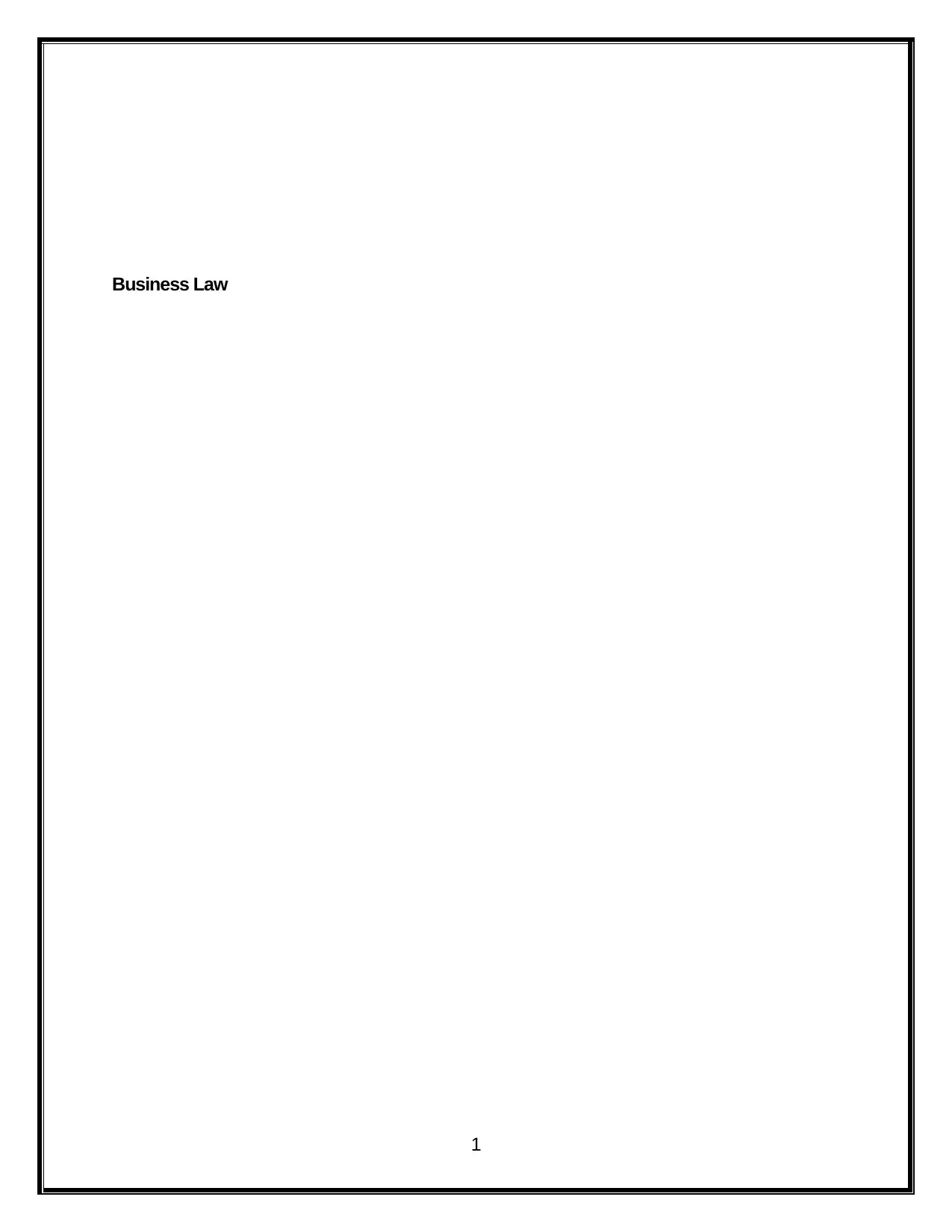
Business Law
1
1
Paraphrase This Document
Need a fresh take? Get an instant paraphrase of this document with our AI Paraphraser
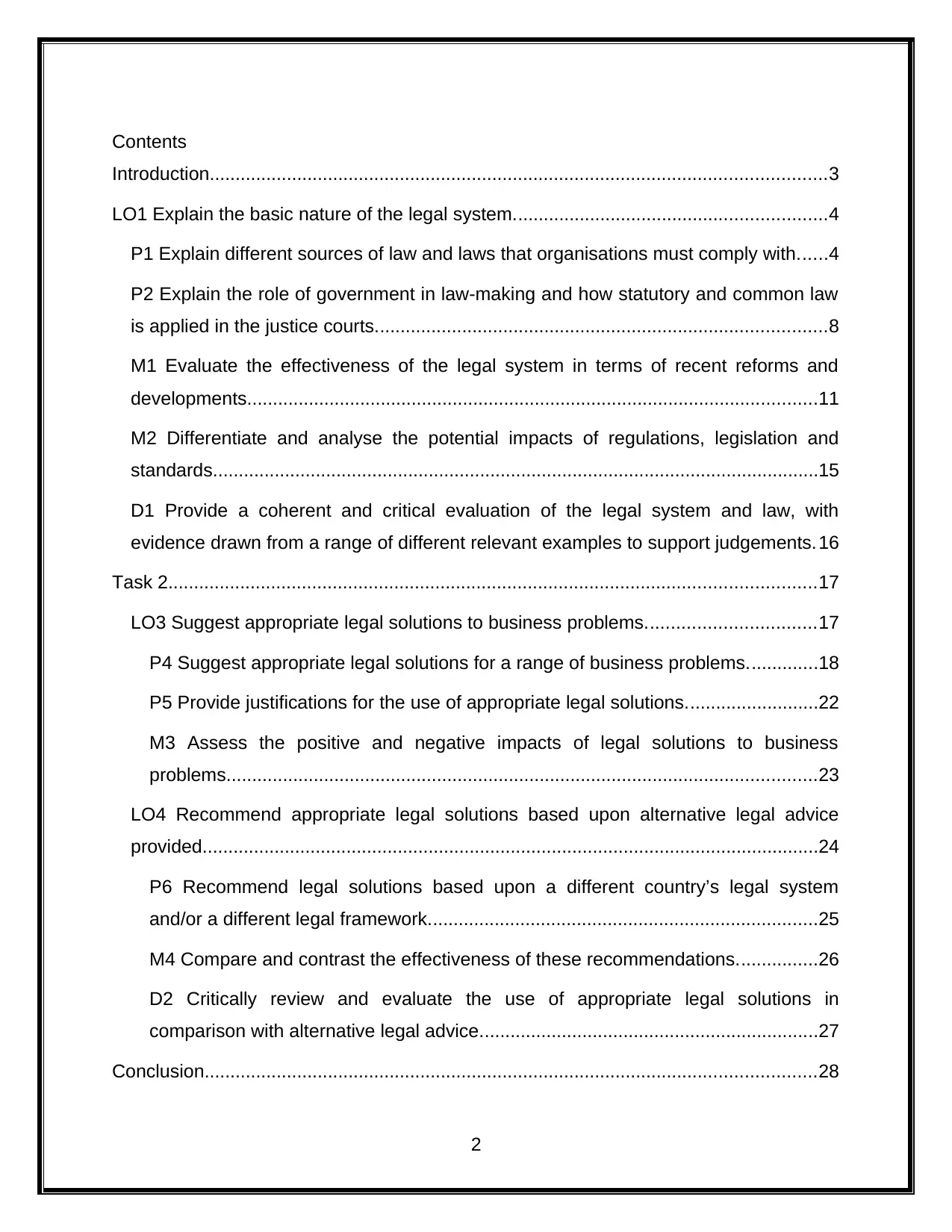
Contents
Introduction........................................................................................................................3
LO1 Explain the basic nature of the legal system.............................................................4
P1 Explain different sources of law and laws that organisations must comply with......4
P2 Explain the role of government in law-making and how statutory and common law
is applied in the justice courts........................................................................................8
M1 Evaluate the effectiveness of the legal system in terms of recent reforms and
developments...............................................................................................................11
M2 Differentiate and analyse the potential impacts of regulations, legislation and
standards......................................................................................................................15
D1 Provide a coherent and critical evaluation of the legal system and law, with
evidence drawn from a range of different relevant examples to support judgements.16
Task 2..............................................................................................................................17
LO3 Suggest appropriate legal solutions to business problems.................................17
P4 Suggest appropriate legal solutions for a range of business problems..............18
P5 Provide justifications for the use of appropriate legal solutions..........................22
M3 Assess the positive and negative impacts of legal solutions to business
problems...................................................................................................................23
LO4 Recommend appropriate legal solutions based upon alternative legal advice
provided........................................................................................................................24
P6 Recommend legal solutions based upon a different country’s legal system
and/or a different legal framework............................................................................25
M4 Compare and contrast the effectiveness of these recommendations................26
D2 Critically review and evaluate the use of appropriate legal solutions in
comparison with alternative legal advice..................................................................27
Conclusion.......................................................................................................................28
2
Introduction........................................................................................................................3
LO1 Explain the basic nature of the legal system.............................................................4
P1 Explain different sources of law and laws that organisations must comply with......4
P2 Explain the role of government in law-making and how statutory and common law
is applied in the justice courts........................................................................................8
M1 Evaluate the effectiveness of the legal system in terms of recent reforms and
developments...............................................................................................................11
M2 Differentiate and analyse the potential impacts of regulations, legislation and
standards......................................................................................................................15
D1 Provide a coherent and critical evaluation of the legal system and law, with
evidence drawn from a range of different relevant examples to support judgements.16
Task 2..............................................................................................................................17
LO3 Suggest appropriate legal solutions to business problems.................................17
P4 Suggest appropriate legal solutions for a range of business problems..............18
P5 Provide justifications for the use of appropriate legal solutions..........................22
M3 Assess the positive and negative impacts of legal solutions to business
problems...................................................................................................................23
LO4 Recommend appropriate legal solutions based upon alternative legal advice
provided........................................................................................................................24
P6 Recommend legal solutions based upon a different country’s legal system
and/or a different legal framework............................................................................25
M4 Compare and contrast the effectiveness of these recommendations................26
D2 Critically review and evaluate the use of appropriate legal solutions in
comparison with alternative legal advice..................................................................27
Conclusion.......................................................................................................................28
2
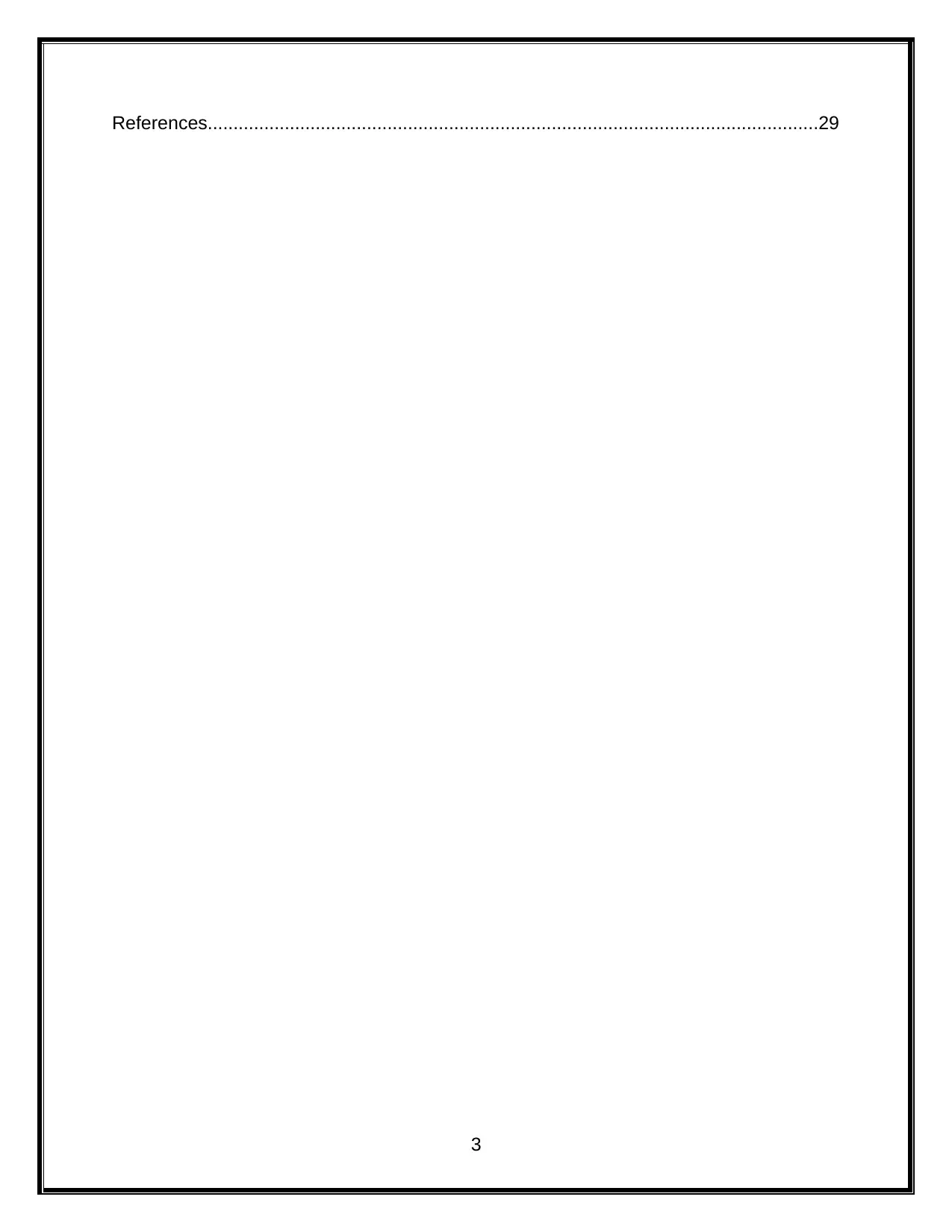
References.......................................................................................................................29
3
3
⊘ This is a preview!⊘
Do you want full access?
Subscribe today to unlock all pages.

Trusted by 1+ million students worldwide

Introduction
Law is a broad term and it states the principles and rules for guiding the behaviours of
human beings and which on the other hand is enforceable by the enforcing body
appointed by the state. There are different kinds and nature of laws that exist for the
different kind of activities that are to be regulated. Like private affairs in the trading
sector is governed by the contract law and illegal conduct of the companies and
organisation is governed by the criminal law which is applicable over all without any
special qualification. The main functions that are performed by the laws in every
country varies from peace maintenance to shaping moral standards, status quo,
rendering the basis for compromise and ensuring the freedom of individual. The English
legal system jurisdiction goes for covering the England and Wales. For developing the
legal compliance for start-up, business selected is Vodafone. Each and every aspect of
the legal compliance by the company have been covered under it. Starting from nature,
sources and applicable laws and their application over the given case studies etc. have
been covered fully.
4
Law is a broad term and it states the principles and rules for guiding the behaviours of
human beings and which on the other hand is enforceable by the enforcing body
appointed by the state. There are different kinds and nature of laws that exist for the
different kind of activities that are to be regulated. Like private affairs in the trading
sector is governed by the contract law and illegal conduct of the companies and
organisation is governed by the criminal law which is applicable over all without any
special qualification. The main functions that are performed by the laws in every
country varies from peace maintenance to shaping moral standards, status quo,
rendering the basis for compromise and ensuring the freedom of individual. The English
legal system jurisdiction goes for covering the England and Wales. For developing the
legal compliance for start-up, business selected is Vodafone. Each and every aspect of
the legal compliance by the company have been covered under it. Starting from nature,
sources and applicable laws and their application over the given case studies etc. have
been covered fully.
4
Paraphrase This Document
Need a fresh take? Get an instant paraphrase of this document with our AI Paraphraser
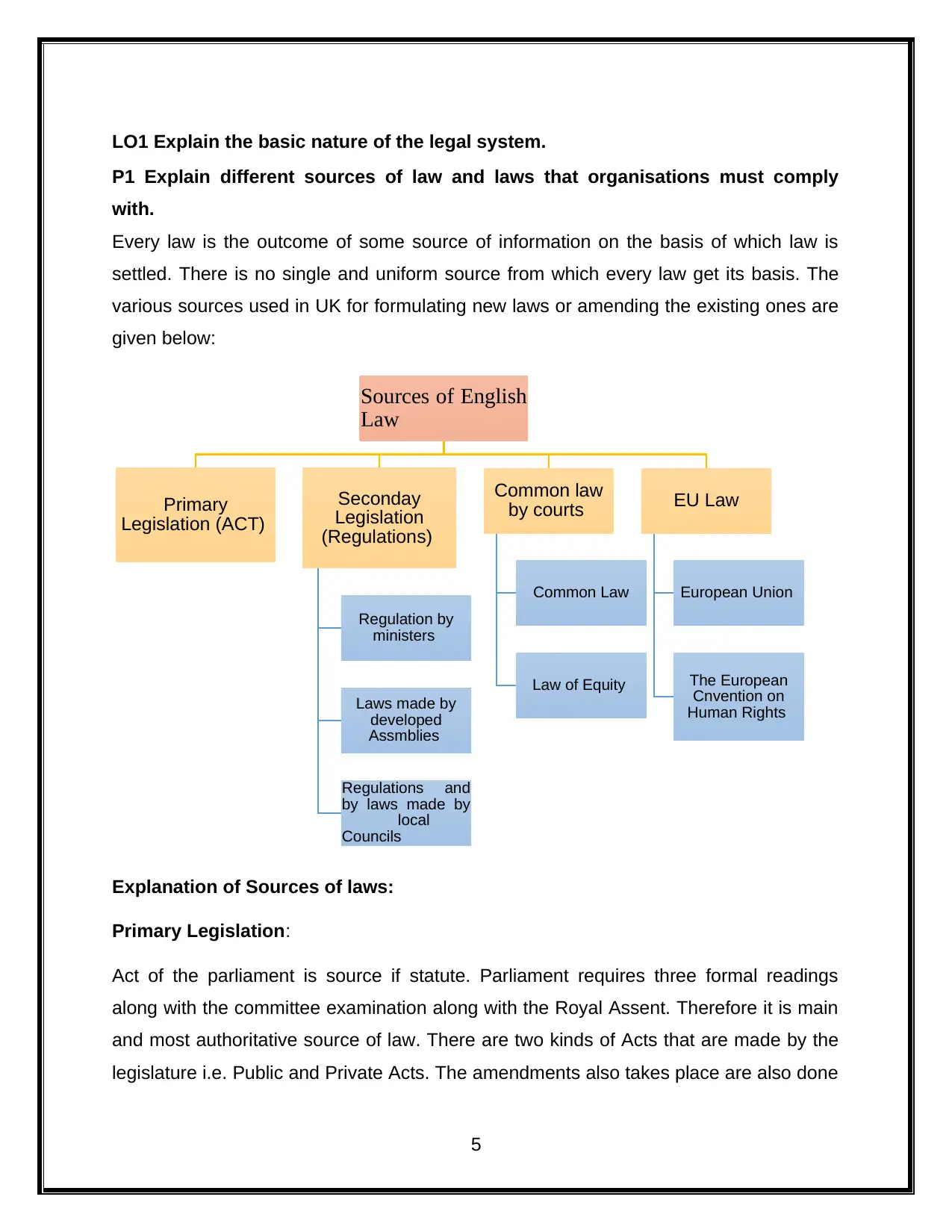
LO1 Explain the basic nature of the legal system.
P1 Explain different sources of law and laws that organisations must comply
with.
Every law is the outcome of some source of information on the basis of which law is
settled. There is no single and uniform source from which every law get its basis. The
various sources used in UK for formulating new laws or amending the existing ones are
given below:
Explanation of Sources of laws:
Primary Legislation:
Act of the parliament is source if statute. Parliament requires three formal readings
along with the committee examination along with the Royal Assent. Therefore it is main
and most authoritative source of law. There are two kinds of Acts that are made by the
legislature i.e. Public and Private Acts. The amendments also takes place are also done
5
Sources of English
Law
Primary
Legislation (ACT)
Seconday
Legislation
(Regulations)
Regulation by
ministers
Laws made by
developed
Assmblies
Regulations and
by laws made by
local
Councils
Common law
by courts
Common Law
Law of Equity
EU Law
European Union
The European
Cnvention on
Human Rights
P1 Explain different sources of law and laws that organisations must comply
with.
Every law is the outcome of some source of information on the basis of which law is
settled. There is no single and uniform source from which every law get its basis. The
various sources used in UK for formulating new laws or amending the existing ones are
given below:
Explanation of Sources of laws:
Primary Legislation:
Act of the parliament is source if statute. Parliament requires three formal readings
along with the committee examination along with the Royal Assent. Therefore it is main
and most authoritative source of law. There are two kinds of Acts that are made by the
legislature i.e. Public and Private Acts. The amendments also takes place are also done
5
Sources of English
Law
Primary
Legislation (ACT)
Seconday
Legislation
(Regulations)
Regulation by
ministers
Laws made by
developed
Assmblies
Regulations and
by laws made by
local
Councils
Common law
by courts
Common Law
Law of Equity
EU Law
European Union
The European
Cnvention on
Human Rights
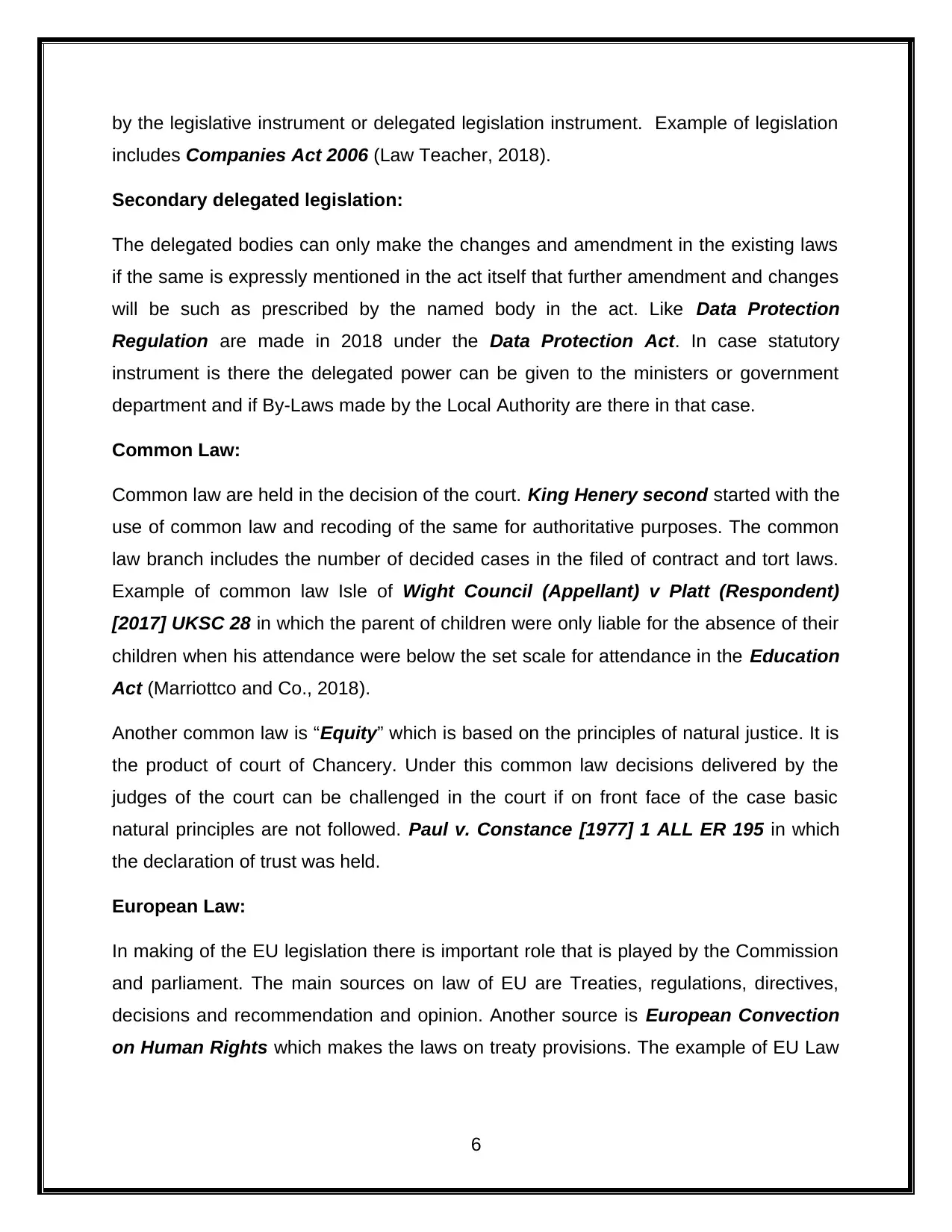
by the legislative instrument or delegated legislation instrument. Example of legislation
includes Companies Act 2006 (Law Teacher, 2018).
Secondary delegated legislation:
The delegated bodies can only make the changes and amendment in the existing laws
if the same is expressly mentioned in the act itself that further amendment and changes
will be such as prescribed by the named body in the act. Like Data Protection
Regulation are made in 2018 under the Data Protection Act. In case statutory
instrument is there the delegated power can be given to the ministers or government
department and if By-Laws made by the Local Authority are there in that case.
Common Law:
Common law are held in the decision of the court. King Henery second started with the
use of common law and recoding of the same for authoritative purposes. The common
law branch includes the number of decided cases in the filed of contract and tort laws.
Example of common law Isle of Wight Council (Appellant) v Platt (Respondent)
[2017] UKSC 28 in which the parent of children were only liable for the absence of their
children when his attendance were below the set scale for attendance in the Education
Act (Marriottco and Co., 2018).
Another common law is “Equity” which is based on the principles of natural justice. It is
the product of court of Chancery. Under this common law decisions delivered by the
judges of the court can be challenged in the court if on front face of the case basic
natural principles are not followed. Paul v. Constance [1977] 1 ALL ER 195 in which
the declaration of trust was held.
European Law:
In making of the EU legislation there is important role that is played by the Commission
and parliament. The main sources on law of EU are Treaties, regulations, directives,
decisions and recommendation and opinion. Another source is European Convection
on Human Rights which makes the laws on treaty provisions. The example of EU Law
6
includes Companies Act 2006 (Law Teacher, 2018).
Secondary delegated legislation:
The delegated bodies can only make the changes and amendment in the existing laws
if the same is expressly mentioned in the act itself that further amendment and changes
will be such as prescribed by the named body in the act. Like Data Protection
Regulation are made in 2018 under the Data Protection Act. In case statutory
instrument is there the delegated power can be given to the ministers or government
department and if By-Laws made by the Local Authority are there in that case.
Common Law:
Common law are held in the decision of the court. King Henery second started with the
use of common law and recoding of the same for authoritative purposes. The common
law branch includes the number of decided cases in the filed of contract and tort laws.
Example of common law Isle of Wight Council (Appellant) v Platt (Respondent)
[2017] UKSC 28 in which the parent of children were only liable for the absence of their
children when his attendance were below the set scale for attendance in the Education
Act (Marriottco and Co., 2018).
Another common law is “Equity” which is based on the principles of natural justice. It is
the product of court of Chancery. Under this common law decisions delivered by the
judges of the court can be challenged in the court if on front face of the case basic
natural principles are not followed. Paul v. Constance [1977] 1 ALL ER 195 in which
the declaration of trust was held.
European Law:
In making of the EU legislation there is important role that is played by the Commission
and parliament. The main sources on law of EU are Treaties, regulations, directives,
decisions and recommendation and opinion. Another source is European Convection
on Human Rights which makes the laws on treaty provisions. The example of EU Law
6
⊘ This is a preview!⊘
Do you want full access?
Subscribe today to unlock all pages.

Trusted by 1+ million students worldwide
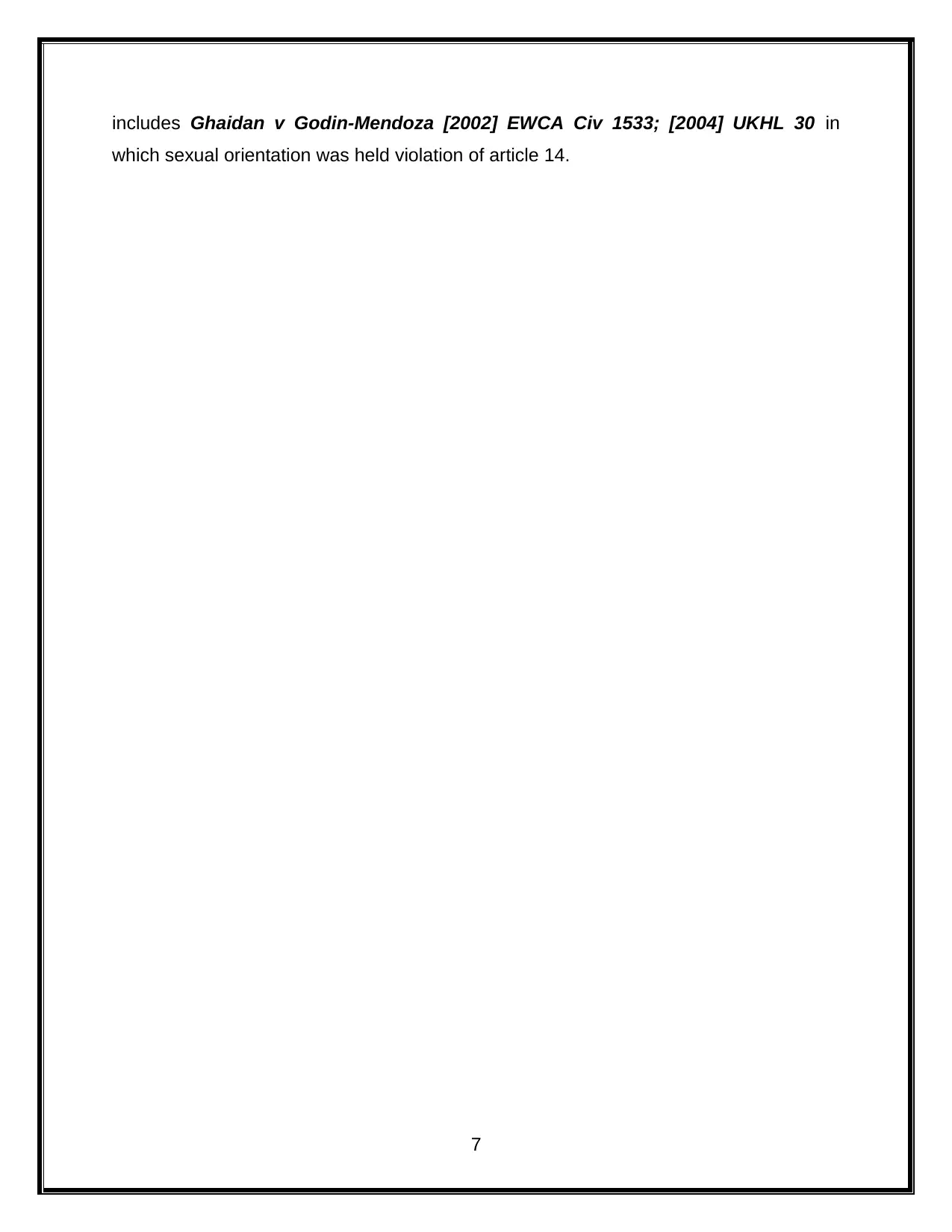
includes Ghaidan v Godin-Mendoza [2002] EWCA Civ 1533; [2004] UKHL 30 in
which sexual orientation was held violation of article 14.
7
which sexual orientation was held violation of article 14.
7
Paraphrase This Document
Need a fresh take? Get an instant paraphrase of this document with our AI Paraphraser
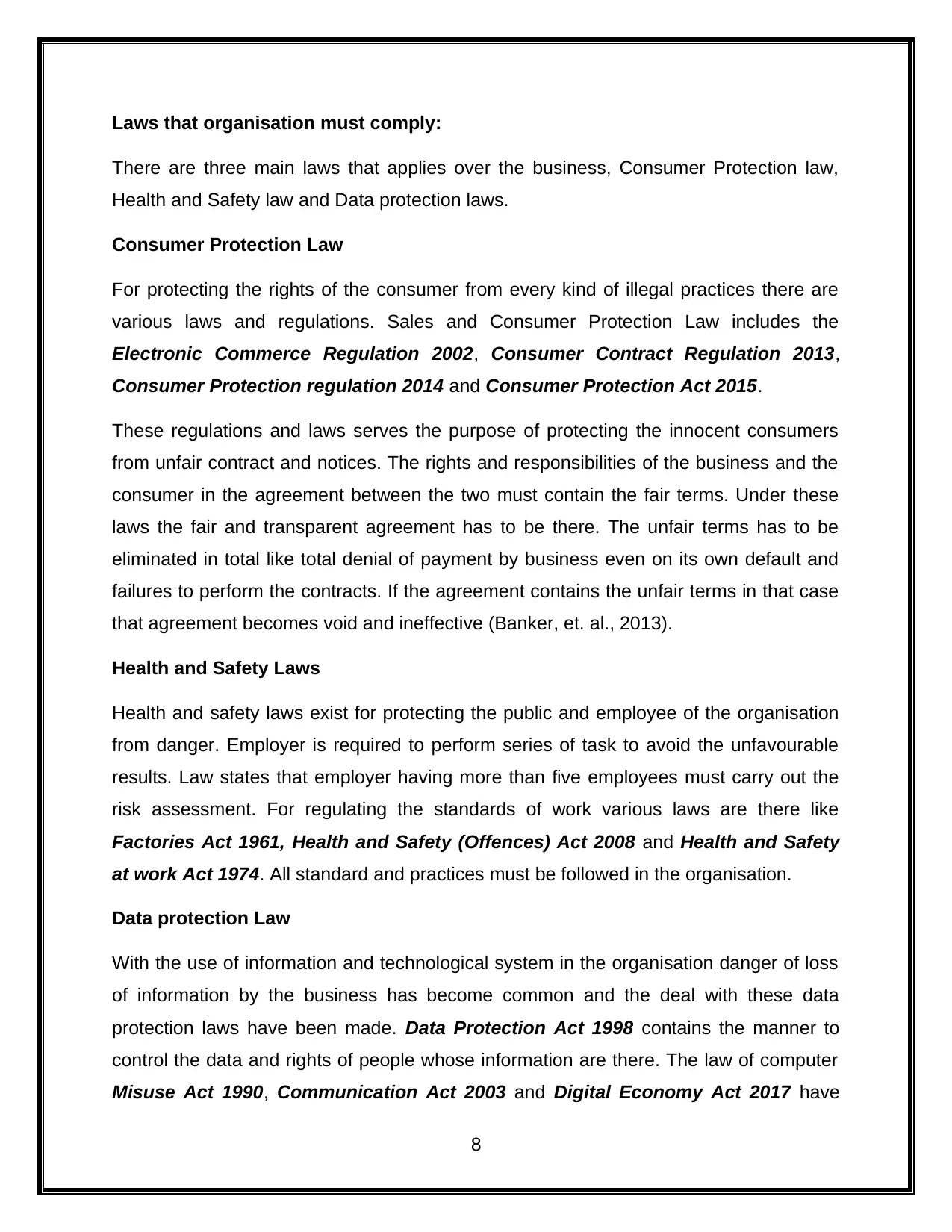
Laws that organisation must comply:
There are three main laws that applies over the business, Consumer Protection law,
Health and Safety law and Data protection laws.
Consumer Protection Law
For protecting the rights of the consumer from every kind of illegal practices there are
various laws and regulations. Sales and Consumer Protection Law includes the
Electronic Commerce Regulation 2002, Consumer Contract Regulation 2013,
Consumer Protection regulation 2014 and Consumer Protection Act 2015.
These regulations and laws serves the purpose of protecting the innocent consumers
from unfair contract and notices. The rights and responsibilities of the business and the
consumer in the agreement between the two must contain the fair terms. Under these
laws the fair and transparent agreement has to be there. The unfair terms has to be
eliminated in total like total denial of payment by business even on its own default and
failures to perform the contracts. If the agreement contains the unfair terms in that case
that agreement becomes void and ineffective (Banker, et. al., 2013).
Health and Safety Laws
Health and safety laws exist for protecting the public and employee of the organisation
from danger. Employer is required to perform series of task to avoid the unfavourable
results. Law states that employer having more than five employees must carry out the
risk assessment. For regulating the standards of work various laws are there like
Factories Act 1961, Health and Safety (Offences) Act 2008 and Health and Safety
at work Act 1974. All standard and practices must be followed in the organisation.
Data protection Law
With the use of information and technological system in the organisation danger of loss
of information by the business has become common and the deal with these data
protection laws have been made. Data Protection Act 1998 contains the manner to
control the data and rights of people whose information are there. The law of computer
Misuse Act 1990, Communication Act 2003 and Digital Economy Act 2017 have
8
There are three main laws that applies over the business, Consumer Protection law,
Health and Safety law and Data protection laws.
Consumer Protection Law
For protecting the rights of the consumer from every kind of illegal practices there are
various laws and regulations. Sales and Consumer Protection Law includes the
Electronic Commerce Regulation 2002, Consumer Contract Regulation 2013,
Consumer Protection regulation 2014 and Consumer Protection Act 2015.
These regulations and laws serves the purpose of protecting the innocent consumers
from unfair contract and notices. The rights and responsibilities of the business and the
consumer in the agreement between the two must contain the fair terms. Under these
laws the fair and transparent agreement has to be there. The unfair terms has to be
eliminated in total like total denial of payment by business even on its own default and
failures to perform the contracts. If the agreement contains the unfair terms in that case
that agreement becomes void and ineffective (Banker, et. al., 2013).
Health and Safety Laws
Health and safety laws exist for protecting the public and employee of the organisation
from danger. Employer is required to perform series of task to avoid the unfavourable
results. Law states that employer having more than five employees must carry out the
risk assessment. For regulating the standards of work various laws are there like
Factories Act 1961, Health and Safety (Offences) Act 2008 and Health and Safety
at work Act 1974. All standard and practices must be followed in the organisation.
Data protection Law
With the use of information and technological system in the organisation danger of loss
of information by the business has become common and the deal with these data
protection laws have been made. Data Protection Act 1998 contains the manner to
control the data and rights of people whose information are there. The law of computer
Misuse Act 1990, Communication Act 2003 and Digital Economy Act 2017 have
8
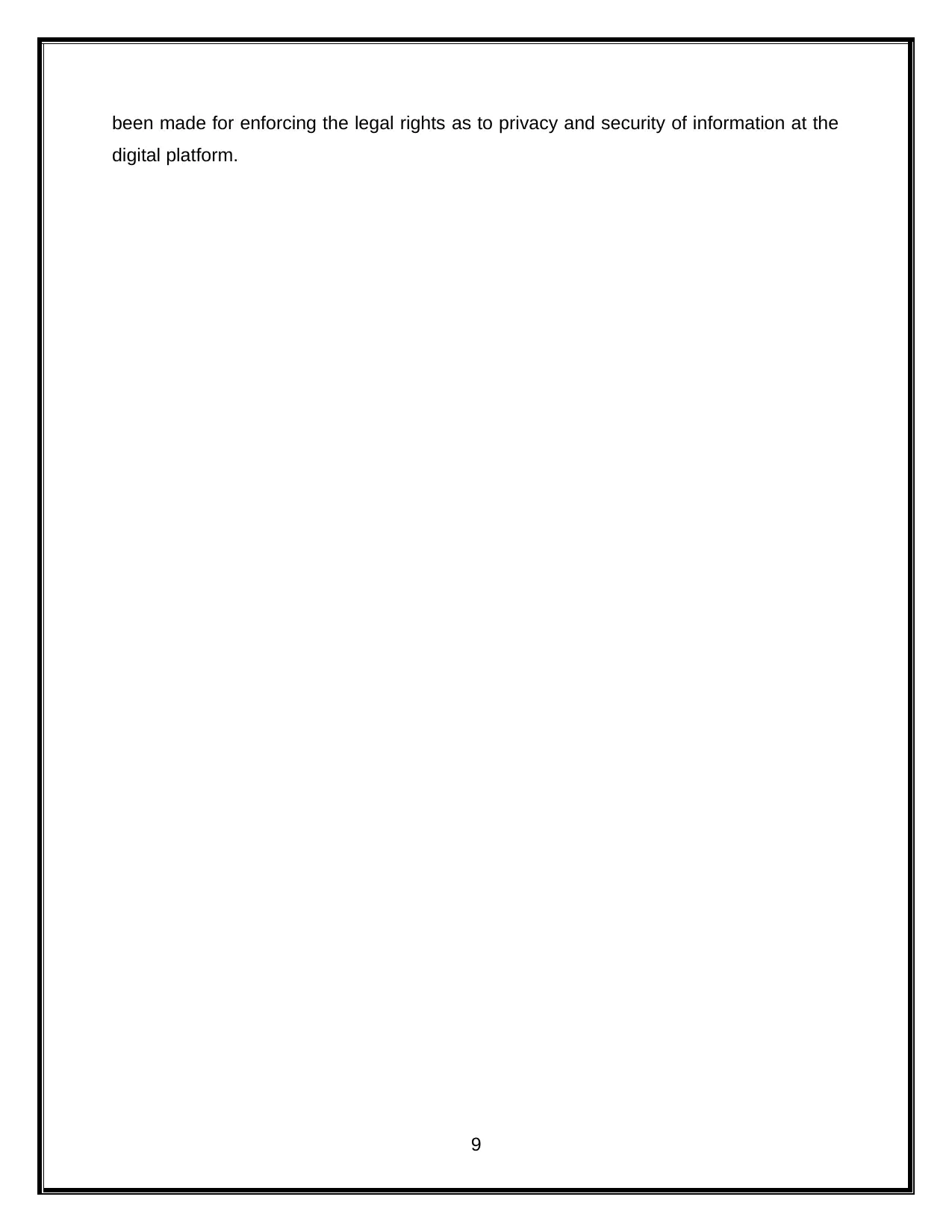
been made for enforcing the legal rights as to privacy and security of information at the
digital platform.
9
digital platform.
9
⊘ This is a preview!⊘
Do you want full access?
Subscribe today to unlock all pages.

Trusted by 1+ million students worldwide
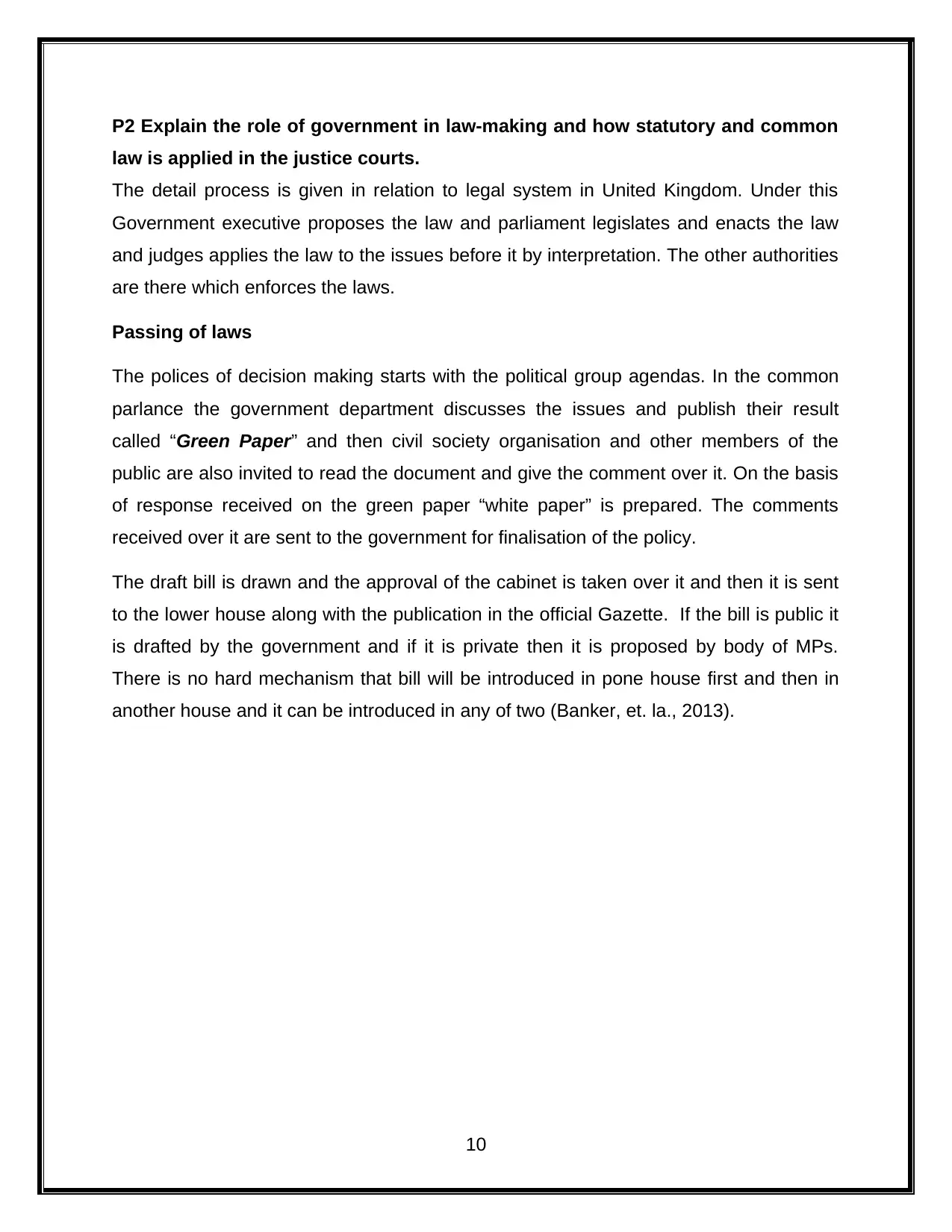
P2 Explain the role of government in law-making and how statutory and common
law is applied in the justice courts.
The detail process is given in relation to legal system in United Kingdom. Under this
Government executive proposes the law and parliament legislates and enacts the law
and judges applies the law to the issues before it by interpretation. The other authorities
are there which enforces the laws.
Passing of laws
The polices of decision making starts with the political group agendas. In the common
parlance the government department discusses the issues and publish their result
called “Green Paper” and then civil society organisation and other members of the
public are also invited to read the document and give the comment over it. On the basis
of response received on the green paper “white paper” is prepared. The comments
received over it are sent to the government for finalisation of the policy.
The draft bill is drawn and the approval of the cabinet is taken over it and then it is sent
to the lower house along with the publication in the official Gazette. If the bill is public it
is drafted by the government and if it is private then it is proposed by body of MPs.
There is no hard mechanism that bill will be introduced in pone house first and then in
another house and it can be introduced in any of two (Banker, et. la., 2013).
10
law is applied in the justice courts.
The detail process is given in relation to legal system in United Kingdom. Under this
Government executive proposes the law and parliament legislates and enacts the law
and judges applies the law to the issues before it by interpretation. The other authorities
are there which enforces the laws.
Passing of laws
The polices of decision making starts with the political group agendas. In the common
parlance the government department discusses the issues and publish their result
called “Green Paper” and then civil society organisation and other members of the
public are also invited to read the document and give the comment over it. On the basis
of response received on the green paper “white paper” is prepared. The comments
received over it are sent to the government for finalisation of the policy.
The draft bill is drawn and the approval of the cabinet is taken over it and then it is sent
to the lower house along with the publication in the official Gazette. If the bill is public it
is drafted by the government and if it is private then it is proposed by body of MPs.
There is no hard mechanism that bill will be introduced in pone house first and then in
another house and it can be introduced in any of two (Banker, et. la., 2013).
10
Paraphrase This Document
Need a fresh take? Get an instant paraphrase of this document with our AI Paraphraser

Application of Statutory and Common Law
No law can be effective if there is no strong mechanism is there for application whether
it is common law or statutory law. We have the example of consequences of the failure
of lack of effective enforcement mechanism i.e. International Law. In case of statutory
law it is binging over all court without any qualification however n case of common law
the validity and applicability of the set common law depends on the court which passed
the decision. The higher court decision are binding over all other courts. For better
enforcement the tribunals and specialised courts are also introduced. First the statutory
acts of parliament are applied by the court deciding the issues and when there is no
statutory work over the issue and decision of the higher jurisdiction is there then it will
work as legal principle. Judicial decision are binding over the lower court due to the
principle of Judicial Precedent and Statre Decisis. These principles are the result of
interpretation done by the judges of court with the three rules of Literal rule, golden
11
First reading requires reading out of bill in the house on its
introduction.
Second reading is elaborated one and each and every provision is
read in detail .
Committee stage is there wherein the member of the parliament
constitute the committee and jargon test and discussion over is done
in order to submit the report as to whether the draft prepared will be
able to meet the ends for which it is proposed
Reporting stage requires the result report submission by the
committee about the suitability of the act.
Third reading involves the final one wherein the voting takes place
and the bill is forwarded for assent of monarch.
Royal Assent is received.
No law can be effective if there is no strong mechanism is there for application whether
it is common law or statutory law. We have the example of consequences of the failure
of lack of effective enforcement mechanism i.e. International Law. In case of statutory
law it is binging over all court without any qualification however n case of common law
the validity and applicability of the set common law depends on the court which passed
the decision. The higher court decision are binding over all other courts. For better
enforcement the tribunals and specialised courts are also introduced. First the statutory
acts of parliament are applied by the court deciding the issues and when there is no
statutory work over the issue and decision of the higher jurisdiction is there then it will
work as legal principle. Judicial decision are binding over the lower court due to the
principle of Judicial Precedent and Statre Decisis. These principles are the result of
interpretation done by the judges of court with the three rules of Literal rule, golden
11
First reading requires reading out of bill in the house on its
introduction.
Second reading is elaborated one and each and every provision is
read in detail .
Committee stage is there wherein the member of the parliament
constitute the committee and jargon test and discussion over is done
in order to submit the report as to whether the draft prepared will be
able to meet the ends for which it is proposed
Reporting stage requires the result report submission by the
committee about the suitability of the act.
Third reading involves the final one wherein the voting takes place
and the bill is forwarded for assent of monarch.
Royal Assent is received.

rule and mischief rule (Williams, 2012). The following up of the principle will result in
legal fulfilment and failure will give rise to action of contempt of court. In this way both
the statutory and common law applied in the efficient manner in UK and these
implementation contribution in the making the legal system effective (Williams, 2012).
Title: Hierarchy of Court
Source: (Law Teacher, 2018)
12
legal fulfilment and failure will give rise to action of contempt of court. In this way both
the statutory and common law applied in the efficient manner in UK and these
implementation contribution in the making the legal system effective (Williams, 2012).
Title: Hierarchy of Court
Source: (Law Teacher, 2018)
12
⊘ This is a preview!⊘
Do you want full access?
Subscribe today to unlock all pages.

Trusted by 1+ million students worldwide
1 out of 42
Related Documents
Your All-in-One AI-Powered Toolkit for Academic Success.
+13062052269
info@desklib.com
Available 24*7 on WhatsApp / Email
![[object Object]](/_next/static/media/star-bottom.7253800d.svg)
Unlock your academic potential
Copyright © 2020–2025 A2Z Services. All Rights Reserved. Developed and managed by ZUCOL.





